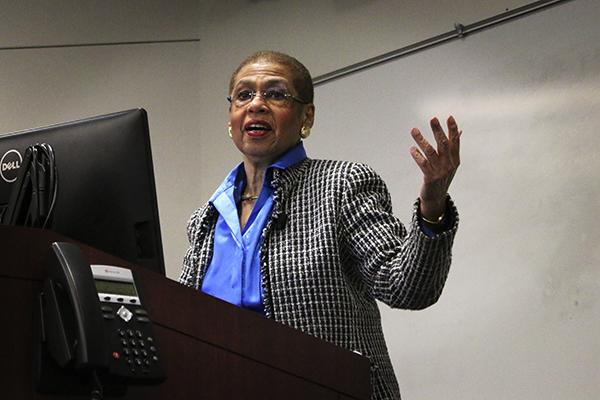D.C.’s non-voting member of Congress is calling to create incentives for former federal prisoners in D.C. for participating in programs to keep them from returning to jail.
Del. Eleanor Holmes Norton, D-D.C., urged lawmakers to include D.C. code felons in the incentive programs into an amendment to the federal Corrections and Recidivism Reduction Act that was passed last week. Norton said in a statement that including D.C. inmates in the incentive programs was one of her top priorities because they help the prisoners successfully transition back into society.
The amendment would make D.C inmates from the Federal Bureau of Prisons eligible for benefits like increased family visitation and phone calls if they participate in programs that could help keep them from returning to jail after being released. The D.C. inmates could also get 10 days of time credits for every 30 days spent in a recidivism program under the amendment.
“Since D.C. code felons are housed in BOP facilities, they must have equal access to services, particularly these new innovative incentive-based programs that will reduce recidivism,” Norton said.
Within three years of release, about two-thirds of prisoners were rearrested – that percentage increased to 76 percent after five years, according to data from the Bureau of Justice Statistics.
The benefits and incentives were already available to non-D.C. inmates under a previous version of the law. Federal BOP inmates are eligible for programs like mental health counseling and drug treatment and educational programs.
The BOP prisoners are also eligible to live in residential re-entry centers, known as “halfway houses,” for up to 19 months before their scheduled release, according to the BOP website.
Kenneth Leon, a professor of criminal justice, said criminals committing felonies in D.C. were disadvantaged by not having access to state correctional department resources. He said re-entry programs are “extremely important” to help keep people from returning to jail.
“There are some serious cons to not being categorized as a state,” Leon said. “You essentially have a system where there’s no state-level department of corrections.”
He said more members of the general population, including GW students, should realize that including D.C. code felons in the programs is important because many of the prisoners will be released back to D.C.
“We think the crime problem is something we don’t have to deal with,” he said. “The people in prison have a release date.”
The amendment would also create “release preparation coordinators” that would help the returning D.C. citizens more successfully transition into society. The coordinators would set up a release plan for the person and direct them to resources to establish housing, employment and healthcare.
Fran Buntman, an assistant professor of sociology, said prison re-entry programs are “absolutely essential” for prisoners preparing to leave jail.
She said different prison facilities vary in the way they transition inmates into being released from prison: Some prisons release prisoners straight from a maximum security facility while others have halfway houses that allow prisoners to have a smoother transition.
“People need a huge set of support if you want them to try and re-enter society in any way that maximizes their chances of successful re-entry,” Buntman said.
Marissa Kirshenbaum contributed reporting.







